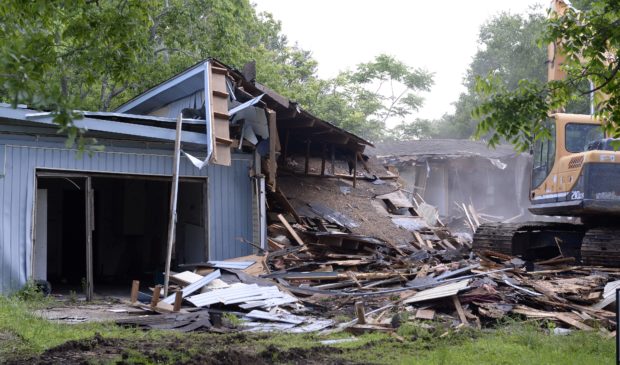Resolutions could change how demolitions are done in Austin
Monday, December 18, 2017 by
Elizabeth Pagano On Thursday, City Council approved two resolutions that direct the city to take a look at the literal and figurative cost of demolitions in Austin. Each could lead to increased fees for the growing number of building demolitions in Austin. Demolitions in the city have increased by about 13 percent per year since 2010.
Mayor Pro Tem Kathie Tovo sponsored both resolutions, and she explained the the effort was part of a deconstructed “demolition omnibus.” The first resolution came out of a recent audit of the city’s demolition process that found the current city process allows unsafe practices.
The resolution initiated code amendments and launched a stakeholder process with the intent of developing a revised demolition permitting process to be reviewed by Council prior to the next budget cycle. That new process could require testing for lead and asbestos, create licensing requirements for demolitions and change noticing requirements, according to the resolution. The resolution also explicitly asks the city manager to calculate fee increases to support additional staff resources and audit recommendations.
Council approved the first demolition resolution in a vote of 10-1, with Council Member Delia Garza voting in opposition.
The second demolition resolution taken up by Council Thursday kept a narrow focus on looking at housing affordability and how it is impacted by demolitions by launching a study of the subject. If a relationship between demolitions and the loss of affordable housing is established, the resolution also asks city staff to look into whether there is a way to require those demolishing buildings to pay into the city’s affordable housing trust fund.
Tovo explained that while she had an initial idea about how the program would work, city legal asked for the flexibility to see whether that program could feasibly be crafted. “We’re initiating staff to explore possibilities,” she said. “There’s nothing illegal about that.”
In the end, the resolution passed 8-1, with Council Member Ellen Troxclair voting no and Council members Garza and Alison Alter absent for the vote.
“We know anecdotally that when houses are demolished and new houses come into their place, there is a loss of affordability,” said Tovo. “We’re losing renters, we’re losing what are market rate affordable units. … This is really designed to (ask) our staff to look really closely at the legal question here, at the economics of it, and determine whether and how we begin to put together an economic analysis.”
David Glenn, who is the director of government affairs at the Home Builders Association of Greater Austin told Council that his organization had joined with the Austin Apartment Association, the Austin Board of Realtors and the Real Estate Council of Austin to write a letter of concern about the resolution.
“We feel like there are still too many questions left unanswered on how a potential ordinance like this may affect affordability in Austin,” said Glenn, who pushed for a “thorough stakeholder process” that included collaboration with the recently formed Anti-Displacement Task Force. Both of these measures were included in amendments proposed by Council Member Jimmy Flannigan, which Glenn voiced support for. In the end, those amendments were largely abandoned, after some discussion, after Tovo explained the narrow focus of her resolution was intentional.
As a result, the stakeholder process was not ultimately included in the resolution, though Tovo noted there might be one down the road, if necessary, and once more information was available.
Tovo said that in February she would have another resolution that looked at demolition. She told the Austin Monitor that it would focus on regulations about relocating houses and salvaging materials from demolitions.
Photo by 1st Lt. Alicia Lacy [Public domain], via Wikimedia Commons.
The Austin Monitor’s work is made possible by donations from the community. Though our reporting covers donors from time to time, we are careful to keep business and editorial efforts separate while maintaining transparency. A complete list of donors is available here, and our code of ethics is explained here.
You're a community leader
And we’re honored you look to us for serious, in-depth news. You know a strong community needs local and dedicated watchdog reporting. We’re here for you and that won’t change. Now will you take the powerful next step and support our nonprofit news organization?









